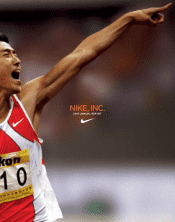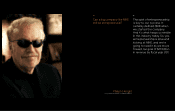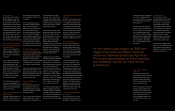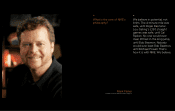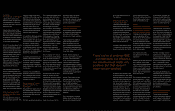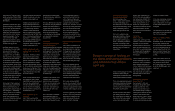Nike 2007 Annual Report Download - page 5
Download and view the complete annual report
Please find page 5 of the 2007 Nike annual report below. You can navigate through the pages in the report by either clicking on the pages listed below, or by using the keyword search tool below to find specific information within the annual report.
What is your job?
I’m Chairman of the Board of
NIKE. On different days that
means different things to me,
but essentially I report to the
Board of Directors and nobody
reports to me. I do a lot of man-
agement by wandering around.
I stop by Sports Marketing and
the Innovation Kitchen. I check
on sourcing and morale from
time to time. Right now I’d say
that’s going pretty well as de-
ned by the year we’ve just had.
What connections do you see
between the original NIKE and
the company today?
There are a lot of things that
haven’t changed at NIKE. One
is attitude. NIKE has always
tried very hard to be the best
it could be.
A group of guys who had no
reason to be in the shoe busi-
ness just got together and
decided to try to build the best
athletic brand in the world.
We started out of my mother’s
laundry room, and I think some
of that spirit is still with us.
And I think we’re in trouble if
we ever lose that spirit.
It’s amazing what you can do
when you are working for a
common cause, with no political
agenda, no personal agendas,
you just want to win.
What does it take to be a great
global company?
Greatness is a word that I don’t
really like. I just think that we
always need to be good and
getting better. If you ever say
you’re great then what is there
to achieve?
The key to becoming good
and better is always manage-
ment. We’re managing our
business pretty well right now.
We’re going to have to get
better to get to the $23 billion
level. That means managing
people inside the company bet-
ter, and it means getting good
people from outside the com-
pany to join us here over the
next three or four years, and I’m
quite optimistic that we’ll do it.
Mark Parker has been CEO for
18 months. How is he doing?
I’ve known and worked with Mark
Parker for over 25 years, and in
some ways we nish each other’s
sentences. I know what he’s
thinking a lot, and he knows what
I’m thinking a lot. On a scale of
one to ten, he’s doing a twelve.
I give him the best advice I have,
which has to do with what I see
going on daily and what I see out
ahead. He listens to me when he
thinks it’s right and sometimes
he doesn’t listen to me.
How does NIKE manage
global change?
Business is clearly becoming
more globalized all the time...
the athletic footwear industry
has been globalized for longer
than most of them.
This last year it’s gone through
big changes. Retail is chang-
ing in the United Kingdom, the
United States, and in China.
Keeping up with that is a real
challenge. Sports Marketing is
changing, becoming much more
competitive as more companies
keep getting into this industry,
which keeps growing.
NIKE looked at a market that
was saturating to some extent
in the United States and has
grown through that. And we’ve
grown enormously in China,
which is a very fast-moving
market, and we’ve begun
inroads in India, and made great
growth strides in Russia. I think
all of those things reect the
progress of our management
team, which has really done
a nice job this last year.
Doing business in China is an
interesting question. We started
there in 1980. It’s obviously a
different place to do business
than a lot of places in the world.
I know a businessman that
I respect who said he’d never
do business in any country that
didn’t have an English-based
judicial system, which certainly
meant he wasn’t going to do
business in China. We’ve ignored
that advice, certainly as far as
China’s concerned, and that’s
been clearly to our benet.
As the industry gets bigger, as
NIKE gets bigger, it has to be
ever faster. That’s an enormous
challenge and always has been.
We’ve got a pretty good record
of meeting that challenge, but
we can never let our guard down.
What is NIKE’s cash deployment
strategy?
We don’t want it to burn a hole
in our pocket. We want to use
it sensibly. Essentially we’ll do
what we’ve been doing, which
is increase our share buy back,
increase our dividend, and look
for opportunities in the acquisi-
tion market that we think can
increase shareholder value. It’s
a simple formula, but execution
is always a challenge, isn’t it?
Are athletes heroes?
There’s really no emotion in
the world today quite like the
emotion off the athletic eld.
Out of that come heroes. NIKE
has made those heroes bigger
than they would be just on their
own, and I’m proud of our role
in doing that.
I don’t really think that has
changed enormously. I think
you’ve had more publicity for
sport, had more publicity for
the athletes in the sports. Some
of those athletes haven’t been
heroes, they’ve been bad guys,
and that detracts from the sport
and from NIKE as a company and
as a business. But for the most
part I see the game just getting
bigger, the heroes becoming
bigger, the emotion becoming
bigger, and to the extent that
NIKE does its job, it really reaps
a benet from all of that.
What are you looking forward
to in sports?
The Olympic Games in China
are going to be a huge event,
probably the biggest Olympics,
and probably the best Olympics
ever. It’ll be a big opportunity
for us to show what we can do in
the world of shoes, and clothes,
and equipment.
1972 was the Olympic Games
where we came out as a brand
for the rst time. Obviously that
was a signicant moment for
us. And the US Olympic trials are
back in Eugene, Oregon, which
is great for us and brings back
a lot of memories, and believe
me, we’re going to try and put
on a show.
Is there a limit to human
potential?
The answer is probably not.
There is to the extent that you’re
not going to run a two-minute
mile. There isn’t to the extent
that the mile performances can
be improved all the time.
You’re not going to see quantum
jumps in performance over the
next 10 or 15 years, but I think
technology will continue to play
a role. So improvements will
be of a smaller percentage, but
they’ll continue to improve in
my view.
Who is your boss?
When we went public in
December 1980, we had 7,500
shareholders, and in a word
it scared me. I can remember
getting that rst list, 7,500
people long, that had invested
in this company. I put that list
on a credenza in back of my
desk, and it was the last thing
I looked at every morning
before I sat down at my desk,
thinking, These people have
invested their savings in you.
Today we have 300,000 share-
holders, and I’ve really never lost
that feeling. We really have an
obligation to do well not only for
ourselves but for them.
As the industry gets bigger, as NIKE gets
bigger, it has to be ever faster. That’s an
enormous challenge and always has been.
We’ve got a pretty good record of meeting
that challenge, but we can never let our
guard down.

